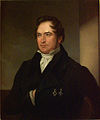
Erik Gustaf Geijer
Encyclopedia

Sweden
Sweden , officially the Kingdom of Sweden , is a Nordic country on the Scandinavian Peninsula in Northern Europe. Sweden borders with Norway and Finland and is connected to Denmark by a bridge-tunnel across the Öresund....
writer, historian
History
History is the discovery, collection, organization, and presentation of information about past events. History can also mean the period of time after writing was invented. Scholars who write about history are called historians...
, poet, philosopher, and composer
Composer
A composer is a person who creates music, either by musical notation or oral tradition, for interpretation and performance, or through direct manipulation of sonic material through electronic media...
. His writings served to promote Swedish National Romanticism. He also was an influential advocate of Liberalism
Liberalism
Liberalism is the belief in the importance of liberty and equal rights. Liberals espouse a wide array of views depending on their understanding of these principles, but generally, liberals support ideas such as constitutionalism, liberal democracy, free and fair elections, human rights,...
.
Biography
Geijer was born at Geijersgården, his family's estate in RansäterRansäter
Ransäter is a minor locality in Munkfors Municipality, Sweden. It is the birthplace of Erik Gustaf Geijer and Tage Erlander....
, Värmland
Värmland
' is a historical province or landskap in the west of middle Sweden. It borders Västergötland, Dalsland, Dalarna, Västmanland and Närke. It is also bounded by Norway in the west. Latin name versions are Vermelandia and Wermelandia. Although the province's land originally was Götaland, the...
. He earned his Master's degree from Uppsala University
Uppsala University
Uppsala University is a research university in Uppsala, Sweden, and is the oldest university in Scandinavia, founded in 1477. It consistently ranks among the best universities in Northern Europe in international rankings and is generally considered one of the most prestigious institutions of...
during 1806. Geijer was a professor of history from 1817 at Uppsala University where a statue now commemorates him. He was rector of Uppsala University during the years 1822, 1830, 1836 and 1843-1844. As a representative of the university, he was a member of the Church of Sweden
Church of Sweden
The Church of Sweden is the largest Christian church in Sweden. The church professes the Lutheran faith and is a member of the Porvoo Communion. With 6,589,769 baptized members, it is the largest Lutheran church in the world, although combined, there are more Lutherans in the member churches of...
clergy: 1828-30 and 1840-41. He was a member of the Swedish Academy
Swedish Academy
The Swedish Academy , founded in 1786 by King Gustav III, is one of the Royal Academies of Sweden.-History:The Swedish Academy was founded in 1786 by King Gustav III. Modelled after the Académie française, it has 18 members. The motto of the Academy is "Talent and Taste"...
(on seat 14) from 1824. In 1835, he became a member of the Royal Swedish Academy of Sciences
Royal Swedish Academy of Sciences
The Royal Swedish Academy of Sciences or Kungliga Vetenskapsakademien is one of the Royal Academies of Sweden. The Academy is an independent, non-governmental scientific organization which acts to promote the sciences, primarily the natural sciences and mathematics.The Academy was founded on 2...
.
Geijer was also a founding member of the Geatish Society
Geatish Society
The Geatish Society, or Gothic League was created by a number of Swedish poets and authors in 1811, as a social club for literary studies among academics in Sweden with a view to raising the moral tone of society through contemplating Scandinavian antiquity...
(Götiska förbundet). In the first issue of its periodical, Iduna, appeared Geijer's most famous poem The Viking (Vikingen), which described the Viking
Viking
The term Viking is customarily used to refer to the Norse explorers, warriors, merchants, and pirates who raided, traded, explored and settled in wide areas of Europe, Asia and the North Atlantic islands from the late 8th to the mid-11th century.These Norsemen used their famed longships to...
as the heroic Norseman that many of us might imagine today and was a turning-point in the rehabilitation of Norse
Norse
Norse may refer to:In history:* Norsemen, the Scandinavian people before the Christianization of Scandinavia** Norse mythology** Norse paganism** Norse art** Norse activity in the British IslesIn language:...
culture among the Swedish people. Geijer also collaborated with Arvid August Afzelius
Arvid August Afzelius
Arvid August Afzelius was a Swedish pastor, poet, historian and mythologist.From 1828 till his death he was parish priest of Enköping...
, in the three volume collection of Swedish folk-songs, Svenska folk-visor från forntiden (Stockholm, 1814–1816).
Although he rose to fame as a nationalist author, Geijer's views changed during his lifetime, and he began to advocate social reform and Liberalism.
Geijersgård
Geijersgården is a historic mansion centrally located in Uppsala, north of the Uppsala University library. Geijersgården is named after Erik Gustaf Geijer, who lived there from 1837 to 1846. The main building was built between 1737-38. The estate gained its present appearance around 1850.In 1934, the estate was taken over by Uppsala University and since 1965 has housed the Dag Hammarskjöld Foundation (Hammarskjöldfonden). The building was restored in the 1983 after a fire in which the building's western parts were badly damaged. The buildings are classified as historic properties under the Swedish Cultural Monuments Act (Kulturminneslagen).
Selected works
- Om falsk och sann upplysning med avseende på religionen (1811)
- Thorild: Tillika en filosofisk eller ofilosofisk bekännelse (1820)
- Svea rikes häfder (1825)
- Svenska folkets historia, I-III, 1832–36
- Minnen (1834)
Other sources
- Andræ, Carl Goran (1983) Siare och nationalmonument: Historikern Erik Gustaf Geijer, 1783-1847 (Almqvist & Wiksell) ISBN 978-9155414290
- Ehnmark, Anders (1999) Minnets hemlighet: En bok om Erik Gustaf Geijer (Norstedts) ISBN 978-9113007250
- Erdmann, Nils Axel Fredrik (2010) Erik Gustaf Geijer: En Minnesteckning (Nabu Press) ISBN 978-1141426928
- Thorsoe, Alexander (2010) Erik Gustaf Geijers Forelaesninger Over Menniskans Historia (Kessinger Publishing) ISBN 978-1160485937
- Olsson, Bernt and Ingemar Algulin (1991) Litteraturens historia i Sverige (Stockholm) ISBN 91-1-913722-2

